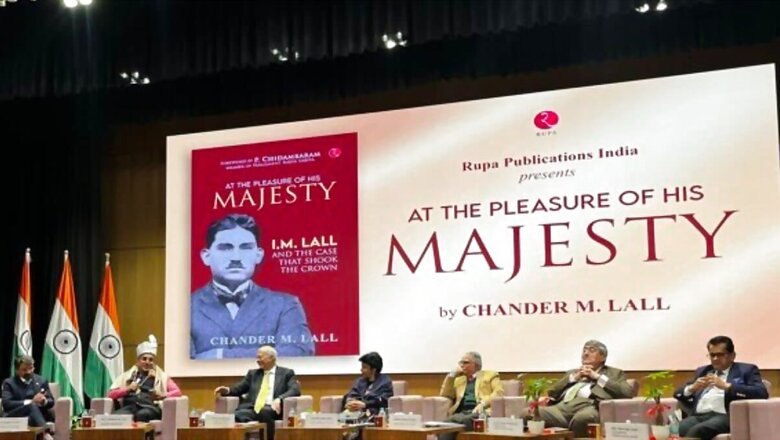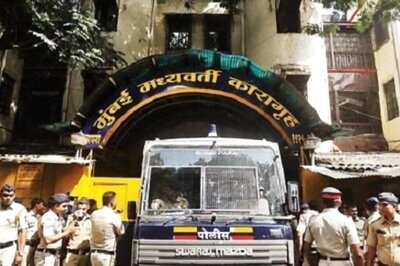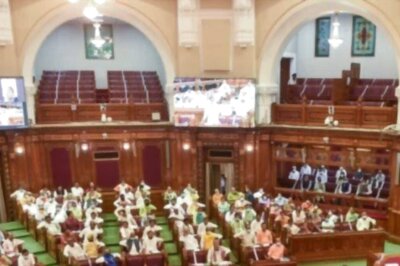
views
As an important legacy book, the senior lawyer and author Chander M Lall’s At the Pleasure of His Majesty: I.M. Lall and the Case that Shook the Crown (Rupa) delves into the extraordinary life and legal battle of Inder Mohan Lall, ICS, a true patriot, and the author’s grandfather. He succeeds with unfolding a gripping narrative that deeply-rooted into the life of Inder Mohan Lall.
Surviving the siege of Kut Al Amara during World War I, IM Lall challenged the British Raj in a landmark legal battle in the High Commissioner for India and the High Commissioner for Pakistan vs IM Lall Case, laying the foundation of Article 311 of the Constitution of India, stipulating due process to be followed before any civil service officer is removed or reduced in rank.
It was 1948, as the book informs, that a landmark verdict was handed down by the Privy Council, the highest court of appeal for the entire Commonwealth of that time. For the first time in the history of the British Empire, a subject had won against it. The book sheds light on the untold tales, from battlefield heroics to courtroom triumphs, shaping not only I.M. Lall’s legacy but also influencing the very fabric of service law in India.
The book puts forward a series of questions exemplifying the remarkable life and achievements of a snobbish jurist with deep commitment for beloved motherland: Who knows of a man (I.M. Lall) who fought in World War I and barely survived a deadly siege, who self-educated himself to eventually become a coveted ICS officer, who put his job on the line to protect India’s heritage, who did not cow down to the injustice of the Raj, who fought the might of the coloniser, his employer, for a greater cause, whose family was on the wrong side of the invisible line at the time of partition when he was in England fighting his case in the Privy Council, whose victory contributed to Article 311 of the Indian Constitution, and last but not the least who would return victorious and contribute to helping the refugees from Pakistan as the Chief Claims Commissioner?
Beyond writing a gripping memoir as well, the author’s sense of belongingness with subject and protagonist is unwavering as he adds, “I know of such a man. I am proud to be his grandson and am thrilled I could document all this by this work of love. And who knows of a man who, at the young age of 18, during partition, had the unenviable task of saving his family and helping them cross the line from Lahore to Amritsar? In the attempt, alas the family would lose a daughter/sister. I know of such a man, and I am proud to call him my father. This book is a first-hand account of history being made about an unsung patriot whose song must be sung. I hope the readers enjoy the music.”
It was the year 1937, when a young Imperial Civil Service or Indian Civil Service (ICS) officer Inder Mohan Lall, invited the wrath of the British Empire when he stood up to protect India’s national treasures. The book accounts well on the fateful episodes that cost him dearly. It came with immediate consequence as suspension from service as the district and session judge. This marked the beginning of an enduring battle for justice, which finally concluded in 1948 with the Privy Council reversing his dismissal and his reinstatement in the verdict of the High Commissioner for India and the High Commissioner for Pakistan vs. I.M. Lall. Rest is history.
In a poignant reflection, Amitabh Kant, G20 Sherpa & Former CEO, NITI Aayog, Government of India, commended the valour and conviction of Lall, and said, “Chander brings alive the personality of his grandfather. He is a remarkable man for several reasons… a young man from Mianwali village (present-day Pakistan) joins the Army and many of us don’t know, but 200,000 Indians fought the First World War, about 95% Indians got killed in that war while fighting for the Crown and here’s a man who went and fought for the Crown…and then he sits for the ICS, gets in, becomes in-charge, fights, loses his job for what he did was obviously right, he fights at all levels of the Crown and finally wins the case. So, it is a remarkable story of courage, determination, of immense amount of belief in himself. And the Indian bureaucracy owes a lot to him because many of us have the courage, determination, and passion to do the right things…and you take the right decisions because you are protected by Article 311, enshrined in the Indian Constitution. Our Indian bureaucracy owes a lot of I.M. Lall.”
From a different angle too, the book is significant when it dwells with I.M. Lall’s moral conviction and highlights his courageous personality. It is worth mentioning here is his appeal made to the British Empire in defence of his case and exposing the glaring biases of judicial procedures under its exploitative rule, “I wish I had been heard by the Governor after a copy of the report had been made available to me, or by the F.P.S.C, or the Government of India, or even by Your Majesty’s Secretary of State for India. I was denied hearing at all stages and the result has been that perverse findings of Mr. Brayne have been accepted by the Secretary of State. I submit to Your Majesty with full sense of responsibility that all this has happened because I was an ICS officer.”
On page 124, the book details a crucial part of the debate between I.M. Lall and the British Empire. On the matter of whether I.M. Lall was given sufficient opportunity to defend his position, the Crown argued that under the prevailing laws, the Governor General had the right to cancel a commission even without providing the officer, whose commission is being cancelled, a reasonable opportunity to show cause. They argued that though I.M. Lall was given sufficient opportunity, he could be dismissed from service even if he had not been given such an opportunity, and that his dismissal was still effective. There can be no restrictions on the right of His Majesty to terminate employment at his pleasure. I.M. Lall’s response was brief, specific and pointed to counter and hammer the overtly biased argument of Empire, “As far as is know Your Majesty has not directed that the power of removal or dismissal should be exercised on your behalf by the Secretary of State for India. The exercise of such power by him in my humble submission, is without authority, arbitrary and illegal. His order removing me from the Civil Service is consequently of no legal validity whatsoever.”
Lall, an unsung patriot, who lived the dark times under the British Empire, of the partition of the country and an existence of a refugee, should be also known for setting up Mianwali colony at the suburbs of Delhi. His legacy and profound service towards refugees are inseparable and the book richly deserves to be credited for bringing hitherto no that well-known accounts of an important chapter of India’s colonial history and the transition of the world’s largest democracy, India. It is of paramount importance to have the greater space in history-writing Lall’s tireless efforts and unwavering dedication to securing justice and significantly impacting the lives of those affected by the partition.
With a detailed overview of the case as well as the events that led up to it, including what Lall’s Hindu family based in Lahore went through during partition, the book should be of interest to anyone with keenness to know about the pre-partition India, its unique common legacy and the difficulty with India attaining its freedom—and started its journey with many odds. The book deserves good readership and a long shelf-life.
Atul K Thakur is policy professional, columnist and author (most recently of ‘Kathmandu Chronicle: Reclaiming India-Nepal Relations’; Penguin Random House India). Views expressed in the above piece are personal and solely those of the author. They do not necessarily reflect News18’s views



















Comments
0 comment